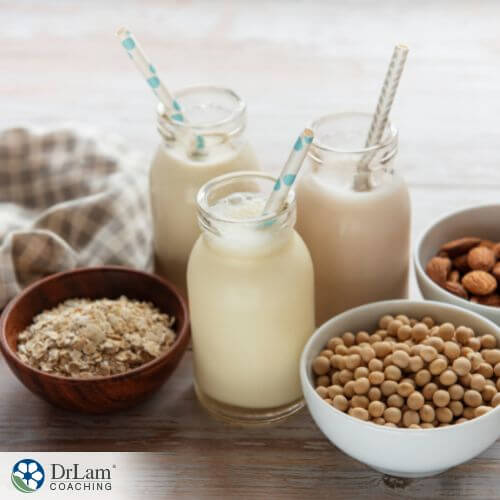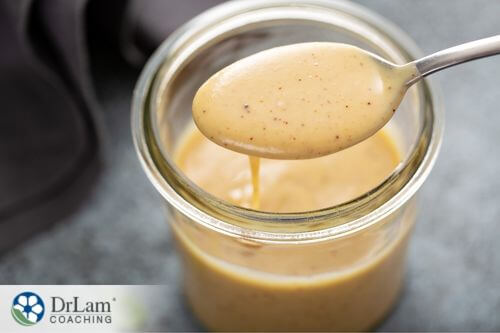As more and more people turn towards healthier foods to avoid food sensitivities, feel better, and improve the health of the environment, plant-based beverages are becoming increasingly popular. Here's our guide to finding the best ones for your body and how to use them.
 A plant-based beverage, often used as a milk substitute, is made out of protein-rich plant sources. These include soy, almonds, cashews, rice, and oats. The latter two, especially, have been lauded for their anti-inflammatory properties. A plant-based beverage also tends to have a lower fat content as compared to whole milk, for example.
A plant-based beverage, often used as a milk substitute, is made out of protein-rich plant sources. These include soy, almonds, cashews, rice, and oats. The latter two, especially, have been lauded for their anti-inflammatory properties. A plant-based beverage also tends to have a lower fat content as compared to whole milk, for example.
Furthermore, this type of beverage is suitable for everyone, whether you are someone who loves steak, a vegetarian, or a vegan. It is also the ideal solution for lactose intolerant people or those with heart health issues resulting from high cholesterol levels.
Do note, however, that those with specific allergies or food intolerances should be careful of the type of plant-based beverage they consume. If you have a nut allergy, for example, keep away from beverages made from nuts. Also, these beverages are not recommended for children under two years of age.
We can find a large variety of plant-based beverage options on our store shelves. You are sure to find one that suits you from the different options. Popular plant-based beverage options include:
Some of these drinks may seem unfamiliar as they are relatively new plant-based beverage options, but they are likely to become more readily available as their popularity increases.
When considering a plant-based beverage, it's best to choose one that is organic, if possible. The plant materials used in organic beverages do not contain harmful chemicals from manufactured pesticides or fertilizers. Nor do they contain added sugars, synthetic vitamins, or artificial flavorings. These ingredients may increase your risk of developing various health issues.
So which is healthier? A plant-based beverage or a traditional glass of milk?
They don't compare very well, because they are two entirely different types of food!
However, when taking nutritional value into account, soy milk most closely resembles cow’s milk. It has a protein content closest to cow's milk, coming in at around 6 grams per cup, and usually contains similar added vitamins. While cow's milk usually contains around 8 grams of protein per serving, many plant-based beverages contain only 1 or 2 grams of protein and little fat. This can make them more comparable to juice than cow's milk, nutritionally.
 Many plant-based milks contain added nutrients that make them more similar to cow's milk, including calcium, vitamin B 12, vitamin A, and vitamin D. However, they also often contain added sugar and emulsifiers. These added ingredients mean you should always read the label of a plant-based beverage at the store to ensure it has the nutrients you might need and doesn't have additives you are avoiding.
Many plant-based milks contain added nutrients that make them more similar to cow's milk, including calcium, vitamin B 12, vitamin A, and vitamin D. However, they also often contain added sugar and emulsifiers. These added ingredients mean you should always read the label of a plant-based beverage at the store to ensure it has the nutrients you might need and doesn't have additives you are avoiding.
This also means that plant-based beverages are a processed food and can contain unexpected toxins from the manufacturing process, so just do your research on your beverage of choice.
Strictly speaking, though, when talking about a plant-based beverage, the term ‘milk’ is not accurate at all. But this does not mean that you cannot substitute it in place of milk and use other foods to fill your nutritional needs. There is actually no science-based reason for us to drink milk (with the exception of small children and infants). We can get all our nutritional needs taken care of by eating a healthy, balanced diet that incorporates plenty of organic fruits, vegetables, and lean protein. You can derive this protein from both animal and plant sources.
If worried about leaving milk and substituting it with a plant-based beverage, consulting your healthcare provider may help you develop a balanced diet. They are best able to identify any problems relating to your diet and daily nutrient intake.
We tend to think of a plant-based beverage as something we drink as is, incorporate into our breakfast regime, or pour into our coffee. And that is it. But you can do so much more with your plant-based beverage.
Many of us limit our eating habits at breakfast. We opt for cereal and our plant-based milk of choice or a smoothie. But you could also prepare something the night before.
A breakfast snack bowl containing carbohydrates like oats, some antioxidant fruits like blueberries or strawberries, and your plant-based beverage of choice may prove a healthier, more filling option. Simply add them to a bowl with a lid and place in the fridge before going to bed at night, then enjoy your breakfast in the morning. If you have a sweet tooth, consider drizzling some honey over your morning feast. You could also add a small handful of mixed seeds to the mix. Good examples include sunflower seeds and pumpkin seeds. Or how about a few slices of papaya or pineapple?
If feeling peckish mid-morning or during the afternoon, you could consider sipping a glass of your favorite plant-based beverage to keep you until your next meal. Alternatively, add a handful of chopped fruit of choice and blend well for a light smoothie. Just be aware that, while this snack has lots of healthy carbs, it likely doesn't have much fat or protein to keep you satiated. You could also use the beverage as a milk substitute in various in-between snacks like homemade oatmeal cookies.
You can use your plant-based beverage in just about any salad dressing that calls for dairy. It adds a creamy taste. Check out the bonus plant-based salad dressing recipe towards the end of this article.
 A plant-based beverage makes a wonderful addition to many dishes. Adding coconut milk to curry, for example, elevates your dish to the next level (note, however, that coconut milk as a plant-based beverage from a carton is different than the full-fat coconut milk that usually comes in a can and is recommended in many dishes).
A plant-based beverage makes a wonderful addition to many dishes. Adding coconut milk to curry, for example, elevates your dish to the next level (note, however, that coconut milk as a plant-based beverage from a carton is different than the full-fat coconut milk that usually comes in a can and is recommended in many dishes).
You can also substitute milk with your beverage of choice, especially when making a creamy pasta or gravy. Another option is soup. Many soups have a creamy base. Try to opt for unsweetened plant-based beverage options for cooking, and be advised that the texture will likely not be as smooth or creamy as dairy alternatives, in many cases.
Many people regard plant-based beverages as sustainable products that decrease our carbon footprint. Livestock of any kind tend to increase greenhouse gas emissions and contribute to environmental degradation. You also need a larger tract of land to keep livestock with a smaller product yield as opposed to farming with fruits or vegetables. In this way, opting to avoid dairy may help reduce the need for livestock and their environmental impact.
One benefit of a plant-based beverage is that it may help address inflammation in your gut if you have a sensitivity to dairy milk. Your gut health plays a significant role in the health of your immune system. Inflammation, although a natural weapon in your immune system’s arsenal to fight off infections, could cause numerous health issues if left unchecked.
Another cause of chronic inflammation is stress. This stress could come from many sources. It includes the chemicals from pesticides and manufactured fertilizers in the food we eat, the chemicals in the air we breathe or found in household cleaning products, emotional stress, or the stress of a hidden food sensitivity. Stress causes a rise in our adrenal glands’ stress hormone production. This production results from the NeuroEndoMetabolic (NEM) stress response, our body’s automatic response system that manages stress. Your immune system and GI tract are part of the Inflammation circuit of the NEM.
Continuous stress may see a continuous inflammatory response. When this happens, instead of helping to heal you, inflammation itself adds more stress to your body. As a result, you may develop one or more inflammatory health issues, including autoimmune disorders and adrenal fatigue.
Drinking a plant-based beverage instead of dairy milk may help reduce your inflammatory response and thus help protect you against many inflammatory health issues. You can also easily incorporate these beverages into your cooking instead of milk. A plant-based beverage is also relatively low in cholesterol, as opposed to both milk from cows and goats.
When purchasing a plant-based beverage, please check whether it is certified organic. The best of these has the United States Department of Agriculture (USDA) organic seal. This seal ensures that the product contains a minimum of 95% organic ingredients by weight. Furthermore, the remaining 5%, made up of unavailable organic ingredients, have been safety reviewed. Salt is an example.
Keep in mind that some companies, even with the organic seal, also produce non-organic products. Some may add the seal without the product really being organic.
Also, opt for a beverage that has no added sweeteners. Sugar is associated with many health issues like diabetes, for example. Although a product is labeled unsweetened, you should always check the label. This type is usually better for cooking as well.
Many products contain colorants and artificial flavors. Stay away from these. While they add visual appeal, they may increase your risk of certain health conditions. Also, stay away from those beverages with nonorganic emulsifiers and gums. Carrageenan, a processed seaweed extract, is another taboo ingredient to look out for.
As for the type of beverage, each has its benefits and has low cholesterol counts. This makes them an ideal milk substitute for those looking after their heart health.
 This quick and easy salad dressing recipe keeps well when refrigerated. Once made, put it in an air-tight container. Use it within three days of making it.
This quick and easy salad dressing recipe keeps well when refrigerated. Once made, put it in an air-tight container. Use it within three days of making it.
A plant-based beverage is not only a milk substitute to pour over your favorite breakfast cereal. It has so many more uses! You can add it to smoothies, soups, sauces, and many more. Furthermore, it is also not only something for vegans! Meat lovers can also reap the benefits of this beverage, especially considering its low cholesterol count.
It's a great option if you have sensitivities to dairy milk and can also help reduce inflammation. Just be aware that plant-based beverages have different nutrients than cow's milk, generally lacking protein and fats. You will need to be sure to get these nutrients from other sources. They also tend to contain added vitamins, which can be good, and other ingredients, which can be bad, so be sure to read the label.
If you would like to know more about healthy diet substitutes to support your health and avoid food sensitivities that work for your body, the team at Dr. Lam Coaching can help. We offer a free** no-obligation phone consultation at +1 (626) 571-1234 where we will privately and confidentially discuss your concerns and provide possible solutions. Alternatively, you can also send us a question through our Ask The Doctor system by clicking here.
Yes! In fact, some types of plant-based beverage may even add extra taste. Those made from nuts, for example, add a complex element of flavor to most baked goods, while coconut milk adds a light and airy flavor. You can even add an acid, like apple cider vinegar, to a plant-based milk to make it more like buttermilk for pancakes or waffles, for example.
